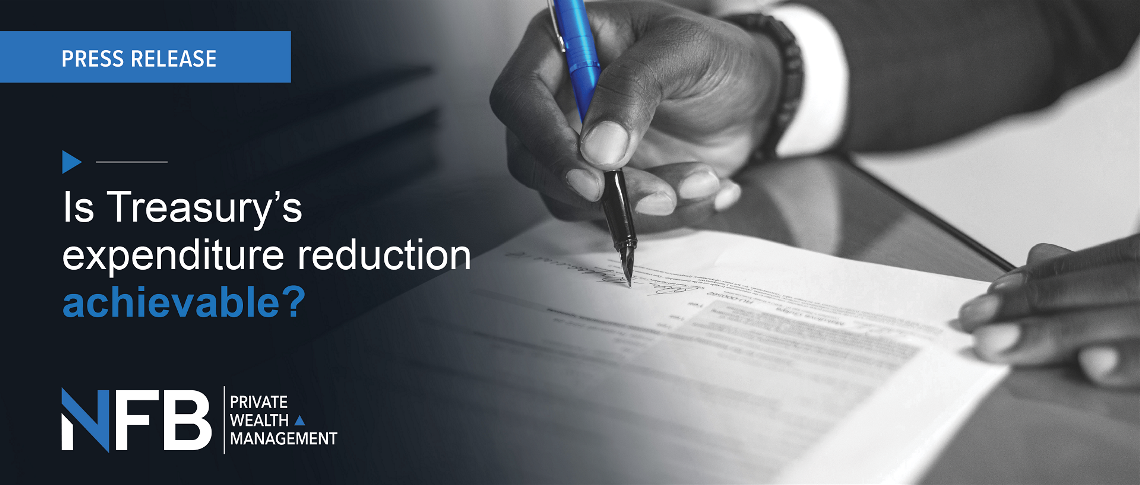Is Treasury's Expenditure Reduction Achievable?
The jury still out on whether the governing party has the stomach or will to make an ideological shift.


Finance minister, Tito Mboweni highlighted the fact that South Africa’s public finances are dangerously overstretched when he delivered the supplementary budget on Wednesday. In addition to putting the spotlight on a growing budget deficit, he said a sovereign debt crisis would be devastating for the country given that it would result in interest rates skyrocketing and allow inflation to take hold.
While the finance minister made numerous references to zero based budgeting in his speech he failed to provide any material detail on a number of key issues including state owned enterprise reform and reductions to the public sector wage bill.
From the outset it was clear there was not going to be any good news in this budget given the devastation caused to an already fragile economy by the recent lockdown. Make no mistake, the country’s fiscal position is in a dire state. The consolidated budget deficit is expected to reach 15.7% of GDP for the current financial year, which is sharply up from February’s estimate of 6.8% of GDP. Given that nobody could have predicted Covid-19 this increase is not unexpected. However, what is of concern is that government have consistently missed predictions on GDP growth, budget deficits and debt levels over the past few years. Of additional concern is the fact that no insight was provided into government estimates regarding the budget deficit in the year beyond this financial year.
Government anticipates that its debt levels will rise to 81.8% of GDP by the end of this fiscal year – compared to an estimate of 65.6% of GDP projected in the February budget – and aims to stabilise debt at 87.4% of GDP in 2023/4. It’s also aiming for a primary surplus that year. No detail was provided on how this primary surplus would be achieved with the exception of the fact that the Medium Term Expenditure Framework process would be guided by the principles of zero-based budgeting, and that government would try to reduce all expenditure that it thought it could no longer afford.
Treasury expects growth to contract by 7.2% - which is substantially worse than February’s forecast of 0.9% growth for 2020 - and expects a revenue shortfall of R300 billion. The minister provided no detail on any expectation of a recovery post 2020.
The temporary Covid-19 grant comes to an end in October. However, given higher levels of unemployment, questions regarding whether this grant will be extended were already being asked prior to this budget. Mboweni, however, appears resolute on the temporary nature of this support.
Announcing that the Covid-19 loan guarantee programme now includes a business restart programme, and has been extended to businesses with a turnover in excess of R300 million, it is of interest that only 5% of the available R200 billion has been lent, begging the question of just how effective this programme has been.
The minister also announced that government intends to borrow $7billion (R121 billion) from international finance institutions. However, he failed to explain whether this figure includes approaches to institutions that have already been made or if this figure is over and above these loans.
Mboweni said the Covid-19 pandemic stressed the need for urgent reforms in SOEs so that they can become financially stable and sustainable. Despite repeated rhetoric in recent months that the state could not afford further SOE bailouts, he announced that the Land Bank would be re-capitalised to the tune of R3 billion given that it was too important an organisation to fail.
It was perhaps no surprise that he failed to mention SAA given that the creditor’s meeting to vote on the business rescue plan has been scheduled for Thursday. In theory, the beleaguered airline will face liquidation should its creditors not back the plan. Mboweni refused to take any questions on SAA in the media briefing following his budget speech, referring all questions related to SAA to Public Enterprises Minister, Pravin Gordhan.
The finance minister also made no commitment to reducing the bloated public sector wage bill although he did say that negotiations were underway. While Treasury needs to find spending adjustments of around R230 billion over the next two years, he provided no detail on how this would be achieved
There is no question that Mboweni provided an honest – albeit brutal - assessment of the country’s current financial positon. However, Treasury’s commitment to debt level projections could come back to haunt the finance minister given that government has consistently tended to under project debt. A further blow to South Africa’s sovereign credit rating could occur should South Africa miss these debt level projections. Mboweni also clearly explained the crisis that will follow if debt is not stabilised.
The trillion dollar question is how achievable the finance ministers expenditure reduction is in reality given that there is very limited evidence of any progress being made thus far in terms of reducing expenditure. The limited detail provided in the budget was somewhat disconcerting, exacerbated by his continual references to the Medium Term Policy Budget Statement which had the air of ‘kicking the can down the road’.
While expenditure cuts are an obvious and immediate solution to South Africa’s budget deficit, the long term solution is sustainable GDP growth. However, for this to be achieved requires a structural, policy and effectively, a seismic ideological shift. The jury is still out on whether the ruling party has the stomach – or will – for this shift.













